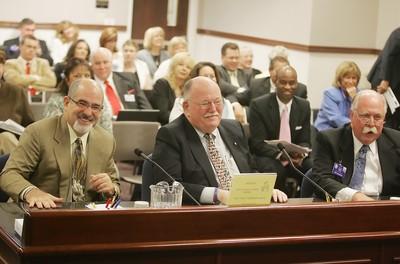Judge, prosecutor oppose bill to keep court records open

CARSON CITY — Preventing judges from easily sealing court cases could allow stalkers to find the addresses of the people they target, Clark County Chief District Judge Kathy Hardcastle testified Wednesday.
"Courts are the place for people to bring their private disputes to obtain an orderly resolution," Hardcastle told the Senate Judiciary Committee. "Citizens should not be required to give up all their rights to privacy."
Hardcastle asked the committee to kill Assembly Bill 519, which would block judges from sealing court records unless they determine open court records would create a danger to the public.
The bill, which passed the Assembly 39-2 on April 18, would require judges to conduct a public hearing to discuss why a case should be confidential before sealing court records.
The bill was prompted by a series of Review-Journal articles in February that found 115 civil cases have been sealed by Clark County judges since 2000.
Hardcastle noted judges in Clark County have handled 110,000 cases since 2000 and just 115 have been completely sealed. But, she added, "thousands" of documents and photos from cases have been sealed.
Often in medical liability cases judges seal records showing the disfigurement of patients, she said. Such pictures could crop up on the Internet if the bill becomes law, she said.
Criminals could gain access to and distribute videotapes showing undercover police officers, the judge said.
Ben Graham, a deputy district attorney in Clark County, said his agency seals about 1,500 criminal cases a year and does not want that procedure altered by the bill.
Hardcastle said the bill could prevent judges from sealing any case or portion of a case.
Senate Judiciary Chairman Mark Amodei, R-Carson City, did not take any action on the bill. He said the committee may take further testimony on Friday.
The committee must approve the bill by May 18 or it will be considered dead for the remainder of the session.
Amodei questioned whether the bill might be an intrusion by the Legislature into the inherent powers of courts.
Ron Titus, director of the Administrative Office of the Courts, noted the Supreme Court has named a commission that will examine the sealing of court records. Its first meeting will be in Las Vegas on May 21. He expects the commission would develop recommendations for the Supreme Court to consider adopting within 90 days.
Hardcastle suggested the Judiciary Committee "set aside" the bill so the commission could look at the issue and then the Supreme Court could take action, if necessary.
But Assemblyman Bernie Anderson, D-Sparks, said too often the sealing of records has hidden hazards to the public. Firestone was able to seal records on the dangers of its tires until the Houston media found out and intervened, he said.
"The sealing of records can hide threats to the public safety," Anderson said.
Attempts to prevent judges from sealing records in product liability cases have failed to receive legislative approval since 1991, he said.
Gary Peck, executive director of the American Civil Liberties Union of Nevada, backed the bill, but said it does not go far enough. A loophole in the bill allows a judge to seal a record if a "preponderance of evidence" shows the sealing furthers a public interest, he said.
Barry Smith, executive director of the Nevada Press Association, said if there are reasons for sealing court records, then "let’s hear why and move on from there."
Hardcastle, however, said if a judge could not easily seal court records, then someone might file false allegations against a teacher and those allegations could haunt the teacher for the rest of his or her career.
She added the public hearing process for sealing records outlined in the bill was confusing and would delay case resolution.
"Why are we inviting strangers into the litigation?" she asked. "It is not clear about the timing of the hearing, the notice of the hearing" that the bill would require to seal a case.
"It would be difficult to deal with," Hardcastle said.
2007 Nevada LegislatureConflicted Justice












